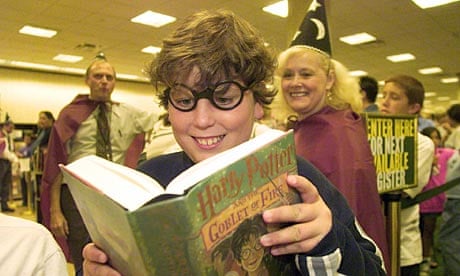A claim that JK Rowling lifted the plot of one of her Harry Potter books from the work of another writer has been struck out after the claimant failed to meet a deadline for paying the first instalment of £1.5m into court as security for costs.
The court of appeal ordered last week that the claimant, Paul Allen, trustee of the estate of Adrian Jacobs, who died in 1997, should pay the first part of the money into court by 4pm on Friday last week, or the case would be struck out.
The claim has now failed as no payment was made.
The move marks the end of a bitterly fought battle in which Rowling was accused of having lifted the plot of the fourth book in the series – Harry Potter and the Goblet of Fire – from Jacobs's book, Willy the Wizard.
She and her publisher, Bloomsbury, had faced a demand for more than A$1bn (£659m) in damages.
Solicitor David Hooper, a partner with the law firm Reynolds Porter Chamberlain, which represented Bloomsbury, said: "They have not paid the money into court.
"The whole thing is a scandal – it has been going on for seven years. It was an absolutely ludicrous case." The claimants had spent well over £1m, he said.
Rowling has described the claim that her book was copied from Willy the Wizard as "not only unfounded but absurd", and said she had never even seen the book until Allen's claim was launched in 2004.
Her solicitor, Gideon Benaim, a partner at Schillings, said: "An enormous amount of time has been wasted having to defend against this claim, when it was quite obvious to us from the outset that it had no chance of success.
"As the judge noted, those behind the claim set about publicising the case with a view to exerting pressure and promoting their 'book'. Quite how they ever thought that we would succumb to pressure indicates a complete lack of understanding on their part. We are glad that the substantive action is now at an end."
Mr Justice Kitchin ordered the payment into court in March, saying that Allen should pay security for 65% of the costs faced by Rowling and her publisher, Bloomsbury.
There were to be three staged payments – the first, of £322,691 for Bloomsbury's costs and £571,613 for Rowling's costs, to be made by 21 April; the second, £24,650 for Bloomsbury's costs and £178,441 for Rowling's costs, to follow by 5 August; and the final payments, of £129,373 for Bloomsbury's costs and £318,975 for Rowling's, to be made by 11 November.
The court of appeal rejected the appeal against that decision last Thursday, saying the first payment should be made by 4pm on Friday or the case would be struck out.
The same claim had already been comprehensively rejected in the US, where a judge in the Manhattan-based US district court for the southern district of New York said that "the contrast between the total concept and feel of the works is so stark that any serious comparison of the two strains credulity".
Harry Potter and the Goblet of Fire was 734 pages long while the Willy the Wizard book consisted of just 16 pages of text, the judge said. He added that the Willy the Wizard book was "entirely devoid of a moral message or intellectual depth", in contrast to Goblet of Fire, a cumulative work in which one scene built on another, the storyline was highly developed and complex, and there was "a highly developed moral core" and overarching messages were conveyed through the plot.
Mr Justice Kitchin, sitting in the chancery division of the high court, had ordered the security for costs payment after having rejected an application by Rowling and Bloomsbury for summary judgment, although he thought the plagiarism claim had an "improbable" chance of success.
But he also made it clear that he was unhappy with the way the litigation was being conducted, and the behaviour of Allen and people associated with him.
Allen, he said, was a nominal claimant – he was in truth suing for the benefit of another. But the evidence from Allen, a property developer, about the means available to him and those supporting him, was "far from full or candid".
There were also indications of a want of good faith on the part of Allen and those associated with him, and those behind the claim "have also engaged in what I think the defendants fairly describe as thinly veiled threats to publicise the allegation that Ms Rowling has engaged in plagiarism".
David Markson, literary agent for the Jacobs estate, and his brother, Max Markson, a public relations executive in Australia, had tried to pressure Rowling into a settlement and had warned that failure to settle the claim would lead to "unwelcome publicity", the judge said.
